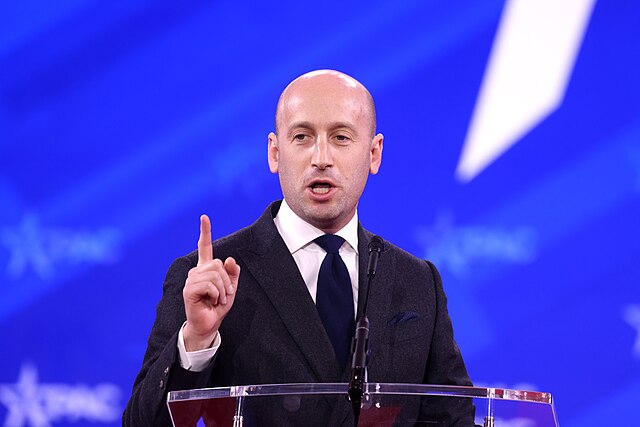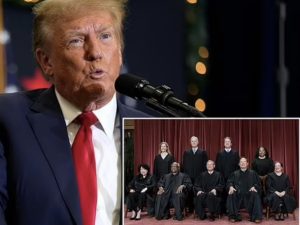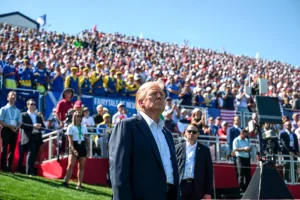An awkward, seconds-long pause during a live CNN interview has ignited a wave of speculation across social media, after White House Deputy Chief of Staff Stephen Miller appeared to freeze mid-sentence while discussing President Donald Trump’s controversial deployment of National Guard troops to U.S. cities.
The moment, brief but conspicuous, unfolded Monday afternoon on CNN News Central during Miller’s remote appearance with anchor Boris Sanchez. What began as a routine policy discussion quickly spiraled into one of the most dissected clips of the week, sparking everything from technical-glitch theories to accusations that Miller had momentarily revealed too much about the administration’s legal rationale for domestic troop deployment.
The Interview That Sparked a Firestorm
Miller had joined CNN to defend the Trump administration’s latest move to deploy National Guard units in response to what the White House has described as “domestic instability” in several U.S. cities. The order, issued under Title 10 of the U.S. Code, has faced immediate legal challenges, including a federal judge’s ruling temporarily blocking deployment in Oregon.
When Sanchez pressed Miller on whether the administration would comply with the court order, the exchange proceeded smoothly at first.
“Well, the administration filed an appeal this morning with the Ninth Circuit,” Miller began, emphasizing that the government had “won an identical case a few months ago” involving the California National Guard.
He then added:
“Under Title 10 of the U.S. Code, the President has plenary authority, has—”
And then, suddenly, he stopped.
For several seconds, Miller stared ahead, blinking rapidly, as Sanchez called his name twice. There was no response. The anchor eventually cut away, saying, “Stephen, I apologize. It seems like we’re having a technical issue,” before the program went to a commercial break.
When the interview resumed, Sanchez said “some wires got crossed,” and the two continued their discussion — though the phrase “plenary authority” was never mentioned again.
CNN’s Explanation — and Public Reaction
CNN later confirmed to TIME that the interruption was indeed a technical issue. According to a network spokesperson, an audio feed from another CNN channel began playing in Miller’s earpiece, disrupting his ability to hear the interviewer.
But by then, social media had already exploded with theories.
Clips of the interview were reposted thousands of times on X (formerly Twitter) and TikTok, with users claiming Miller had not suffered a technical malfunction at all — but rather realized mid-sentence that he had said something he “wasn’t supposed to.”
One viral TikTok captioned the moment, “Stephen Miller said the quiet part out loud accidentally,” suggesting that he was on the verge of confirming an expansive, possibly authoritarian interpretation of presidential power. Another user wrote, “He didn’t glitch — he was told to stop talking in his earpiece.”
Others took a lighter tone, editing the footage into memes that likened the Trump adviser’s frozen expression to a computer error. Within hours, “Stephen Miller glitch” was trending nationwide.
What Is “Plenary Authority”?
At the heart of the viral moment lies an obscure but powerful legal term. The Legal Information Institute at Cornell University defines plenary authority as a type of power that is “broadly construed and often absolute in nature, leaving little room for external limitation.”
In the context of Title 10, which governs the organization and deployment of U.S. armed forces, the phrase refers to the president’s ability to federalize state National Guard units under certain circumstances — such as rebellion, insurrection, or invasion.
However, the scope of that authority has long been debated. Legal scholars note that while the president does have significant powers to call up the Guard, those powers are not unlimited and remain subject to judicial review and congressional oversight.
According to Professor Elaine Morrison, a constitutional law expert at Georgetown University, the term “plenary authority” carries political baggage precisely because it is often invoked to justify actions that stretch executive limits.
“In theory, Title 10 gives the president wide latitude,” Morrison explained. “But in practice, there are constitutional checks. The courts can intervene, Congress can restrict funding, and states retain certain rights over their militias. So while the phrase sounds absolute, it isn’t.”
The Legal Backdrop
The Trump administration’s recent use of the National Guard has already prompted a flurry of lawsuits. A district judge in Oregon ruled last week that the federal government could not unilaterally deploy state-controlled Guard units without the governor’s consent.
The administration appealed that ruling, arguing that the president’s constitutional role as commander in chief supersedes state objections in times of “domestic disorder.”
Miller’s invocation of “plenary authority,” even if interrupted, appeared to hint at that broader interpretation — one that critics say could effectively allow the federal government to deploy troops anywhere in the country under the guise of maintaining order.
Civil rights groups have expressed concern that such language echoes provisions of the Insurrection Act, a 19th-century law that allows the president to deploy federal forces domestically in cases of rebellion or obstruction of justice.
Trump has publicly floated using that law before, notably during civil unrest in 2020 and again in 2024 following large-scale protests in several major cities.
The White House Stance
After the CNN appearance, Miller’s office released a statement saying that his remarks “were interrupted by a technical malfunction unrelated to the substance of his answer,” and reaffirmed the administration’s position that its actions are “fully consistent with both Title 10 and the Insurrection Act.”
“The president has always acted within his constitutional authority to ensure law and order,” the statement read. “Any suggestion that the administration is pursuing unlawful or authoritarian measures is false and politically motivated.”
The White House declined to comment further when reached by TIME, referring questions to the Department of Justice.
A senior administration official, speaking on background, said the phrase “plenary authority” has been part of internal policy discussions for months and does not imply that Trump intends to exceed legal limits. “It simply reflects the president’s responsibility to act decisively in a national emergency,” the official said.
The Broader Context
The controversy comes at a moment of heightened tension between federal and state governments. Trump’s second term has been marked by frequent clashes with governors — particularly Democrats — over immigration, policing, and public safety policy.
Earlier this year, several states resisted federal directives to deploy the Guard to southern border regions, citing concerns over cost, readiness, and legality. The administration responded by reasserting its authority to federalize the Guard “in defense of national security.”
Miller, a longtime Trump adviser known for his hawkish and combative style, has been central to crafting the administration’s domestic security agenda. His CNN appearance was intended to reassure the public that the new deployments were lawful and targeted. Instead, it reignited debate about executive overreach.
The Viral Moment as Symbol
While CNN quickly clarified the incident, the brief silence — less than ten seconds — has taken on an outsized cultural life. To some, it epitomized the administration’s aggressive posture toward centralized power. To others, it was simply another case of internet overreaction.
Political analyst Dr. Marcus Hill of the Brookings Institution summed it up this way:
“We’re in an age where every blink and pause is dissected for meaning. The real issue isn’t whether Stephen Miller glitched — it’s that Americans are deeply uneasy about how much authority presidents now wield without clear boundaries.”
Looking Ahead
Whether the administration’s appeal succeeds or not, the underlying debate — how far a president can go in using the military at home — is far from settled.
If the Ninth Circuit rules in Trump’s favor, it could reinforce the White House’s view of near-total executive discretion under Title 10. If it upholds the district court’s injunction, it would be a major legal rebuke, potentially curbing one of the administration’s most assertive domestic policies.
For now, Stephen Miller’s brief on-air freeze stands as a snapshot of the high-stakes constitutional struggle unfolding in real time — a moment when a single phrase, “plenary authority,” became a lightning rod for the broader question of power in modern America.

Emily Johnson is a critically acclaimed essayist and novelist known for her thought-provoking works centered on feminism, women’s rights, and modern relationships. Born and raised in Portland, Oregon, Emily grew up with a deep love of books, often spending her afternoons at her local library. She went on to study literature and gender studies at UCLA, where she became deeply involved in activism and began publishing essays in campus journals. Her debut essay collection, Voices Unbound, struck a chord with readers nationwide for its fearless exploration of gender dynamics, identity, and the challenges faced by women in contemporary society. Emily later transitioned into fiction, writing novels that balance compelling storytelling with social commentary. Her protagonists are often strong, multidimensional women navigating love, ambition, and the struggles of everyday life, making her a favorite among readers who crave authentic, relatable narratives. Critics praise her ability to merge personal intimacy with universal themes. Off the page, Emily is an advocate for women in publishing, leading workshops that encourage young female writers to embrace their voices. She lives in Seattle with her partner and two rescue cats, where she continues to write, teach, and inspire a new generation of storytellers.









